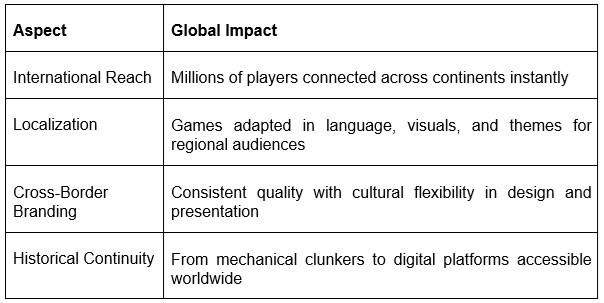
Image: Source AI
Casino entertainment has transformed from a regional pastime into a global cultural experience. What was once bound to physical destinations in cities like Las Vegas has now extended across continents, screens, and languages. The shift has been powered by technology, but what makes the current age unique is how casino entertainment has adapted to diverse audiences while maintaining a universal appeal.
This expansion is not only about access. It is about how entertainment adapts to different cultures while remaining instantly recognizable. The blend of tradition and technology has allowed the casino industry to create experiences that feel personal in one country yet familiar worldwide.
International Reach and Instant Access
At the heart of globalization lies reach. A single digital platform can now connect millions of players across dozens of countries in seconds. Casino games, which once required physical attendance, are now accessible on laptops, tablets, and smartphones. This shift has changed not only how players experience games but also how casinos build their brands.
The use of digital distribution makes casino entertainment part of a shared global conversation. Whether in North America, Europe, or Asia, players are often interacting with the same catalog of games. The speed of this access and its consistency across borders has given the industry a truly international identity.
Cross-Border Branding in Casino Entertainment
Branding in the digital age is no longer confined to neon lights or iconic buildings. Instead, it spans apps, streaming platforms, and digital communities. Casinos now market themselves as lifestyle brands that connect across borders. This type of branding must carry consistent quality while also respecting local identities.
Here lies the role of digital platforms, which have become the backbone of international casino entertainment. Digital platforms, including online slots, allow casino entertainment to reach global audiences instantly. These online slots present familiar mechanics but often feature themes that are localized to culture and history. The very same game can carry different storylines or graphics in separate markets, blending global access with regional appeal. In this way, digital casino branding is both universal and uniquely personal. Online slots also illustrate how one type of game can adapt to multiple cultures while retaining its recognizable structure, making them a core driver of international expansion.
The Historical Context of Slot Machines
To appreciate how online platforms became central to global branding, it helps to look back at history. Slot machines began as mechanical “clunkers” in the late 19th century, using physical reels and levers. Over the decades, these machines evolved into the digital and video-based systems that filled casinos worldwide. Today, that transformation continues online.
For readers interested in the full journey, from the early one-armed bandits to blockchain-driven formats, the history of slot machines provides a detailed overview. This evolution shows how an invention rooted in one place can grow into a universal entertainment form, carried forward by technology and globalization.
Localization and Cultural Nuance
Global reach would mean little without the ability to localize. Casinos now adapt interfaces, visuals, and themes to reflect cultural preferences. A game that resonates in Tokyo may not appeal in Madrid unless it is adjusted for local tastes. That is why themes often vary: ancient civilizations, classic fruit machines, or modern cinematic designs each find audiences in different parts of the world.
Localization is not limited to visuals. Language translation, user interface design, and even customer interaction styles are tuned to suit regional expectations. This effort ensures that global access feels personal, not generic. Without this cultural sensitivity, casino entertainment would risk alienating players rather than connecting them.
The Blending of Local and Global Experiences
What makes digital casino entertainment unique is its ability to be both shared and local. A player in Germany may join the same digital event as someone in Brazil, while both experience content tailored to their language and culture. This balance reflects a broader cultural shift where entertainment is globalized but not homogenized.
Cross-border branding plays a key role in sustaining this balance. Casinos present themselves with consistent values, such as trust and entertainment quality, while allowing local adaptations in theme and tone. This is not an easy task, but it is essential to maintain credibility across multiple markets.
Why Globalization Matters to Players
For players, globalization means more choice, more connection, and more familiarity. A traveler might open an app abroad and find the same slot game they played at home, yet reimagined with local artwork. That recognition creates comfort while the new design offers novelty.
Globalized access also fosters shared communities. Players across borders may discuss strategies, compare experiences, or enjoy events simultaneously. This interconnectedness adds a new social dimension to an activity that was once solitary and location-bound.
Global Casino Entertainment at a Glance

A Look Ahead
As technology continues to expand, casino entertainment will likely deepen its cross-border presence. Cloud gaming, virtual reality, and AI-driven personalization all hold potential for further globalization. Yet even as the tools evolve, the core principles remain the same: adapt to culture, connect people across borders, and present experiences that are both familiar and new.



















